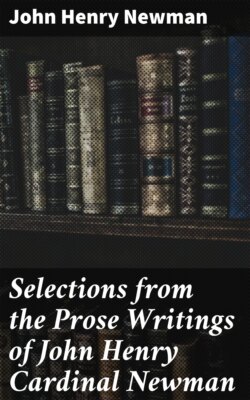Читать книгу Selections from the Prose Writings of John Henry Cardinal Newman - John Henry Newman - Страница 3
На сайте Литреса книга снята с продажи.
INTRODUCTION
ОглавлениеTable of Contents
It has come to be universally admitted that Cardinal Newman fulfills his own definition of a great author: "One whose aim is to give forth what he has within him; and from his very earnestness it happens that whatever be the splendor of his diction, or the harmony of his periods, he has with him the charm of an incommunicable simplicity.
"Whatever be his subject, high or low, he treats it suitably and for its own sake.... He writes passionately because he feels keenly; forcibly, because he conceives vividly; he sees too clearly to be vague; he is too serious to be otiose; he can analyze his subject, and therefore he is rich; he embraces it as a whole and in its parts, and therefore he is consistent; he has a firm hold of it, and therefore he is luminous.
"When his imagination wells up, it overflows in ornament; when his heart is touched, it thrills along his verse. He always has the right word for the right idea, and never a word too much....
"He expresses what all feel but cannot say; and his sayings pass into proverbs among his people, and his phrases become household words, idioms of their daily speech, which is tessellated with the rich fragments of his language, as we see in foreign lands the marbles of Roman grandeur worked into the walls and pavements of modern palaces."
Newman may be said to have handled England's prose as Shakespeare handled her verse. His language was wrought up little by little to a finish and refinement, a strength and a subtlety, thrown into the form of eloquence, beyond which no English writer of prose has gone. Nor is his excellence that of mere art in form; he possesses not only skill, which he calls an exercise of talent, but power—a second name for genius—which itself implies personality and points to inspiration.
His mind was large, logical, profoundly thoughtful, imaginative, intense, sincere, and above all, spiritual; his soul was keen, delicate, sympathetic, heroic; and his life, at once severe and tender, passionate and self-controlled, alone and unlonely, stands out in its loftiness and saintliness, a strange, majestic contrast to the agitation and turmoil of "confused passions, hesitating ideals, tentative virtues, and groping philanthropies" amidst which it was lived.
Both by word and work did Newman lead forth his generation on the long pilgrimage to the shrine of Truth, and England of the nineteenth century has no surer claim to holiness and genius for her great sons than that set upon John Henry Newman.
He was born in London, 1801; studied, taught, and preached at Oxford; became the chief promoter of the Tractarian Movement of 1833; entered the Catholic Church in 1845; founded the Oratory at Birmingham, 1848; was created Cardinal by Pope Leo XIII. 1879; died at Edgbaston, 1890.
Any attempt to choose from the writings of Newman what seems most desirable for brief class studies is certain to be woefully embarrassed by the very wealth of matter; and apology for risking the choice would be due, were it not lost sight of in the desire to see a literary model so pure, varied, animated, forceful, luminous—"a thing of light and beauty"—given to our students.
What is more significant of the Life Book of the saintly Oxford Scholar than his self-written epitaph: "Ex umbris et imaginibus in veritatem"?
